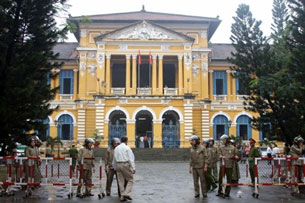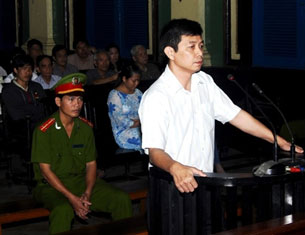




BANGKOK—A Vietnamese court in Ho Chi Minh City has convicted four pro-democracy campaigners of trying to overthrow the state. The sentenced dissidents were the most high-profile targets of a widespread crackdown that has led to numerous arrests and prompted an international outcry.
The best-known defendant, U.S.-trained human rights lawyer Le Cong Dinh, 41, received five years in prison.
All could have faced the death penalty for subversion. They were convicted under Article 79 of Vietnam’s criminal code, or “carrying out activities aimed at overthrowing the people’s administration.”
The trial in Vietnam's rainy commercial hub lasted about eight hours. The convictions and sentences took longer to read before the court than the recess during which they were written, Reuters reported.
Dinh and computer programmer Nguyen Tien Trung confessed to working with the outlawed Vietnam Democratic Party to press for a multiparty political system in Vietnam.
Internet entrepreneurs Tran Huynh Duy Thuc and Le Thang Long recanted confessions made in June on national television, saying police had coerced them.
Trung was handed a seven-year jail term and Thuc 16 years. Long, charged with establishing a political discussion group, received five years.
All will be required to spend several years under house arrest after their release.
Dinh admitted breaking the law by meeting with foreign groups and advocating multiparty democracy.
“From the bottom of my heart, I myself and these three other defendants had no intention to overthrow the government,” he said.
“During my studies overseas, I was influenced by Western attitudes toward democracy, freedom, and human rights.”

Reporters were barred from using recording devices or cameras, and when one of the defendants accused police of abuses, the closed-circuit system’s speakers were overwhelmed by steady static, the German news agency DPA reported.
International broadcasts of news about the trial were blocked in Vietnam.
Courtroom packed
Le Thi Minh Tam, Nguyen Tien Trung’s mother, said that relatives were barred from the courtroom and that police presence was heavy.
“Even the defendants’ family members couldn’t sit in the courtroom. We could only see things through a screen outside,” Tam said.
“Many other people sat in the room, including lots of my neighbors, who are in our [Communist] party cell. The authorities sent cars to their houses, picked them up, and gave each person 50,000 dong,” she said.
“I don’t know who gave out the 50,000 dong ... I am wondering, but there is no answer. My family and Dinh’s family protested vehemently, but they said they only did what they were told to. I think the neighbors were there today to fill that room, to prove the trial was open.”

“The police also called me yesterday, telling me to stay at home and saying that if I tried to go out they would have to escort me, and that I am not allowed to attend the trial,” Luat said.
International outcry
Foreign diplomats attending the trial protested the verdicts, and human rights groups were quick to condemn the proceedings.
Danish Ambassador Peter Lysholt-Hansen, the sole European ambassador permitted to attend, said the defendants had been sentenced for actions “which in a democracy are not unlawful.”
The United States condemned the arrests and repeated its concern after the verdict.
“We would like to reiterate our deep concern over the arrest and conviction of persons for the peaceful expression of their beliefs, political or otherwise, by the government of Vietnam,” said Ken Fairfax, U.S. consul general in Ho Chi Minh City.
“There are serious concerns about the whole process,” Danish Ambassador Peter Lysholt Hansen told reporters.
He was one of a small number of diplomats granted permission to watch the trial with journalists via closed-circuit television in separate room.
“We will very strongly urge the government of Vietnam to grant amnesty to all four.”
Amnesty International called for the “immediate and unconditional release of four Vietnamese prisoners of conscience jailed today for their peaceful pro-democracy activism.”
“These people should never have been arrested in the first place, let alone charged and sentenced. The trial allowed no meaningful defense for the accused, demonstrating all too clearly the lack of tolerance for free speech and peaceful dissent, and the court’s lack of independence,” said Brittis Edman, Amnesty International’s Viet Nam researcher.
The sentences come against a backdrop of escalating repression against critics of the government.
A new wave of arrests began in May 2009, targeting independent lawyers, bloggers, and pro-democracy activists critical of government policies. More than 30 prisoners of conscience remain behind bars after unfair trials, according to Amnesty.
Sophie Richardson, Asia advocacy director for Human Rights Watch, called the rights situation in Vietnam “grim.”
Dinh’s conviction in particular, Richardson said, “is a very worrying sign that we expect will accelerate this year—again in part because of the lack of vocal criticism from the international community.”
“I think the fact that today we see a trial going on of Le Cong Dinh—a Fulbright winner, a lawyer, [an] establishment figure in Vietnamese political terms—that he is being tried, I think shows you just how grim the situation is in Vietnam for people who are trying to peacefully articulate views that are different from the government’s.”
Original reporting by Thanh Truc for RFA’s Vietnamese service. Translated from the Vietnamese by Hanh Seide. Vietnamese service director: Khanh Nguyen. Executive producer: Susan Lavery. Written in English by Sarah Jackson-Han.